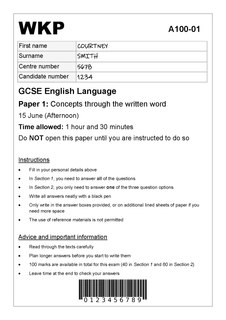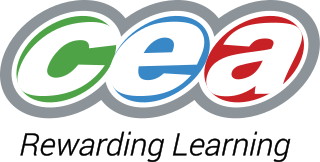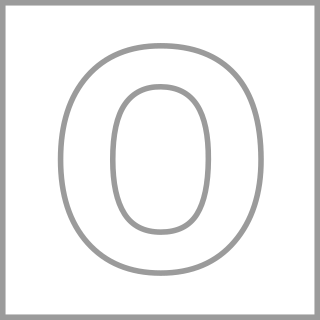Related Research Articles

The General Certificate of Secondary Education (GCSE) is an academic qualification in a particular subject, taken in England, Wales, and Northern Ireland. State schools in Scotland use the Scottish Qualifications Certificate instead. Private schools in Scotland may choose to use GCSEs from England.

Edexcel is a British multinational education and examination body formed in 1996 and wholly owned by Pearson plc since 2005. It is the only privately owned examination board in the United Kingdom. Its name is a portmanteau term combining the words education and excellence.
An examination board is small board organization that sets examinations, is responsible for marking them, and distributes results. Some are run by governmental entities; some are run as not-for-profit organizations.

The Council for the Curriculum, Examinations & Assessment (CCEA) is a Non-departmental public body (NDPB) of the Department of Education. Its function and purpose is described in Part VIII of the Education (NI) Order 1998.

The International General Certificate of Secondary Education (IGCSE) is an English language based examination similar to GCSE and is recognised in the United Kingdom as being equivalent to the GCSE for the purposes of recognising prior attainment. It was developed by University of Cambridge International Examinations. The examination boards Edexcel and Oxford AQA also offer their own versions of International GCSEs. Students normally begin studying the syllabus at the beginning of Year 10 and take the test at the end of Year 11. However, in some international schools, students can begin studying the syllabus at the beginning of Year 9 and take the test at the end of Year 10.
Curriculum 2000 was a reform of A Level examinations in the United Kingdom. It was introduced in September 2000. An A Level under this reform consists of four or six units studied over two years. Normally, two or three units are assessed at the end of the first year, and make up a stand-alone Advanced Subsidiary qualification. Another two or three modules are assessed at the end of the second year, which make up the A2 Level. A2 units do not form a qualification in their own right; the satisfactory completion of the AS and A2 units in the same subject is required to constitute a complete A Level qualification.
Free-standing Mathematics Qualifications (FSMQ) are a suite of mathematical qualifications available at levels 1 to 3 in the National Qualifications Framework – Foundation, Intermediate and Advanced.
A Uniform Mark Scale, or UMS, is a way of standardising the marking of papers across different examination boards, allowing someone to compare two marks marked by two different examination boards. Grades are then calculated using grade boundaries set at particular UMS scores.

The A-Level is a subject-based qualification conferred as part of the General Certificate of Education, as well as a school leaving qualification offered by the educational bodies in the United Kingdom and the educational authorities of British Crown dependencies to students completing secondary or pre-university education. They were introduced in England and Wales in 1951 to replace the Higher School Certificate.
Advanced Level (A-Level) Mathematics is a qualification of further education taken in the United Kingdom. In the UK, A-Level exams are traditionally taken by 17-18 year-olds after a two-year course at a sixth form or college. Advanced Level Further Mathematics is often taken by students who wish to study a mathematics-based degree at university, or related degree courses such as physics or computer science.

The O-Level is a subject-based qualification conferred as part of the General Certificate of Education. It was introduced in place of the School Certificate in 1951 as part of an educational reform alongside the more in-depth and academically rigorous A-Level in England, Wales and Northern Ireland. Those three jurisdictions replaced O-Level gradually with General Certificate of Secondary Education (GCSE) completely by 1988 and, the International General Certificate of Secondary Education (IGCSE) over time. The Scottish equivalent was the O-grade.

The Office of Qualifications and Examinations Regulation (Ofqual) is a non-ministerial government department that regulates qualifications, exams and tests in England. Colloquially and publicly, Ofqual is often referred to as the exam "watchdog".
Examination boards in the United Kingdom are the examination boards responsible for setting and awarding secondary education level qualifications, such as GCSEs, Standard Grades, A Levels, Highers and vocational qualifications, to students in the United Kingdom.
The General Certificate of Education (GCE) Advanced Level, or A Level, is a main school leaving qualification in England, Wales, Northern Ireland, the Channel Islands and the Isle of Man. It is available as an alternative qualification in other countries.
The Joint Council for Qualifications (JCQ) is a community interest company acting as a single voice for the eight largest qualification providers in the United Kingdom offering GCSE, GCE, Scottish Highers and vocationally related qualifications: AQA, CCEA, City & Guilds, Edexcel, NCFE, OCR, SQA and WJEC. The JCQ closely monitors examination administration, invigilation of exams at individual schools and activities of exams officers.
The Entry Level Certificate (ELC) is a qualification offered in England, Wales and Northern Ireland. It lies at Entry Level of the National Qualifications Framework, pitching it just below GCSE level.
Additional Mathematics is a qualification in mathematics, commonly taken by students in high-school. It is applied to a range of problems set out in a different format and wider content to the standard Mathematics at the same level.
An Extended Project Qualification (EPQ) is a qualification taken by some students in England and Wales, which is equivalent to 50% of an A level. They are part of level three of the National Qualifications Framework. It is currently graded A*-E.
In the United Kingdom, the Technical Level, or more commonly, the Tech Level, is a school leaving qualification offered by educational bodies to students completing secondary or pre-university education. Tech-Levels are the vocational equivalent of the A-levels and is generally required for university entrance. Tech-Levels are generally worked towards over two years and split into a number of parts, with one part studied in each year. The first part is known as the Certificate Level. The second part is known as the Diploma Level and is more in-depth and rigorous than the Certificate Level. The Certificate Level is a qualification in its own right, and the Certificate Units combined with the Diploma units forms the complete Technical Level qualification. T Levels will offer students a mixture of classroom learning and ‘on-the-job’ experience during an industry placement of at least 315 hours.
References
- ↑ EducationGuardian.co.uk | Advanced extension awards 2004
- ↑ JCQ | Withdrawal of Advanced Extension Award (AEA) specifications Archived July 25, 2011, at the Wayback Machine
- ↑ Edexcel: Advanced Extension Award (AEA) Extended!
- ↑ QCA | Advanced Extension Awards Archived March 14, 2009, at the Wayback Machine
- ↑ Edexcel: Mathematics Advanced Extension Award (AEA) extended further until 2015
- ↑ "Mathematics | Advanced Extension Award". Pearson qualifications. Retrieved 21 August 2020.
{{cite web}}: CS1 maint: url-status (link) - ↑ "Decisions on regulating Advanced Extension Awards" (PDF). Ofqual. June 2018. Retrieved 15 February 2022.
- ↑ "Changes to awarding of GCSE, AS and A level: guide for teachers, student, parents & carers: summer 2020". GOV.UK. Retrieved 21 August 2020.